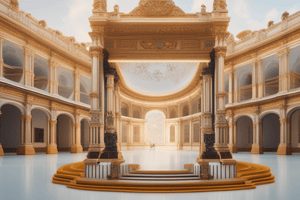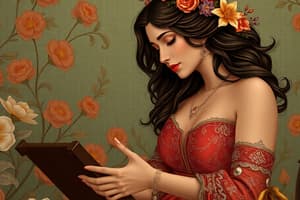Podcast
Questions and Answers
What does the term 'Classical Period' refer to?
What does the term 'Classical Period' refer to?
- A revival of reason, nature, and morality (correct)
- A movement toward ornate styles
- An era of chaotic music and art
- A focus on technology and innovation
Who are some philosophers associated with the Classical Period?
Who are some philosophers associated with the Classical Period?
Hume, Voltaire, Rousseau
What is the time frame of the Classical Era?
What is the time frame of the Classical Era?
1705 to 1820
Neoclassic means 'old classic.'
Neoclassic means 'old classic.'
Which characteristic describes Classical Music?
Which characteristic describes Classical Music?
What types of themes did Classical Artists explore?
What types of themes did Classical Artists explore?
Classical Architecture heavily depended on the design of the ______.
Classical Architecture heavily depended on the design of the ______.
Who was Franz Joseph Haydn?
Who was Franz Joseph Haydn?
What significant title describes Wolfgang Amadeus Mozart?
What significant title describes Wolfgang Amadeus Mozart?
Ludwig van Beethoven was born in Austria.
Ludwig van Beethoven was born in Austria.
What innovative style did Christoph Willibald Gluck use?
What innovative style did Christoph Willibald Gluck use?
What is Jean-Antoine Watteau known for?
What is Jean-Antoine Watteau known for?
William Hogarth was a sculptor.
William Hogarth was a sculptor.
Define 'Aristocrat'.
Define 'Aristocrat'.
What characterizes a 'Pauper'?
What characterizes a 'Pauper'?
What role did the Esterhazys play for Haydn?
What role did the Esterhazys play for Haydn?
What type of scenes are associated with Fetes Galantes?
What type of scenes are associated with Fetes Galantes?
What is 'Divisionism' in art?
What is 'Divisionism' in art?
What does the Patron System imply?
What does the Patron System imply?
What is a 'Free-Lance Musician'?
What is a 'Free-Lance Musician'?
Flashcards are hidden until you start studying
Study Notes
Classical Period Overview
- Transitioned from ornate styles of the Baroque Era toward reason, nature, and morality.
- Influenced by philosophers such as Hume, Voltaire, and Rousseau advocating for the common good.
- Derived inspiration from Greek and Roman artistic styles.
- Lasted approximately from 1705 to 1820, focusing on balance and clarity.
Neoclassic Definition
- "New classic" reflects a revival of previous classical styles in a contemporary context.
Characteristics of Classical Music
- Created to engage a broad audience, encompassing aristocrats and the middle class.
- Evoked emotion and passion while adhering to social etiquette.
- Emphasized predictability for listener familiarity.
Classical Artists' Themes
- Modernized historical subjects in artworks.
- Explored grand narratives of good versus evil.
- Focused on detailed representations of heroic features.
Classical Architecture Features
- Heavily drew from Greek designs, prominently featuring columns and large porticos.
Franz Joseph Haydn
- Renowned composer born and died in Austria (1732-1809).
- Worked almost 30 years for the Esterhazy family, leading their musical establishment.
- Achieved fame after moving to England post the prince's death.
Wolfgang Amadeus Mozart
- Child prodigy from Salzburg, Austria (1756-1791) known for his early music encounters.
- Desired independence as a freelance composer, leading to financial struggles.
- Died impoverished in Vienna.
Ludwig van Beethoven
- Born in Bonn, Germany (1770-1827), a pivotal composer in the Classical Era.
- Experienced success as a freelance composer, studying under Haydn.
- Despite losing his hearing by 1802, continued to compose renowned works.
Christoph Willibald Gluck
- Esteemed German opera composer (1714-1787) credited with paving the way for future composers like Mozart.
- Integrated diverse emotional styles in opera, rooted in classical themes.
Jean-Antoine Watteau
- French painter (1684-1720) celebrated for a light and dreamy painting style.
- Notable for "fêtes galantes," depicting romantic outdoor scenes.
- Early adopter of divisionism technique in painting.
Jacques-Louis David
- Most significant Neoclassic painter of the 18th century, active during the French Revolution (1748-1825).
- His works reflected ancient Rome's values—civic virtue, self-sacrifice, and duty.
- Founded the French Institute of Art, replacing the Royal Academy of Art.
William Hogarth
- English painter and engraver, notable for his satirical works.
Aristocrat Definition
- Individuals or families belonging to the upper class, characterized by wealth and privilege.
Pauper Definition
- A person lacking support or means, dependent on others for survival.
Esterhazy Family
- Aristocratic family that employed Haydn, known for hiring top musicians in Europe.
- Resides in Schloss Esterhazy, a luxurious estate in Austria.
Fêtes Galantes
- A genre of painting by Watteau, featuring scenes of nobility engaging in leisurely outdoor activities.
Divisionism Technique
- An approach in painting involving juxtaposing colors so that the viewer's eye merges them, rather than mixing on the palette.
Patron System
- Wealthy aristocrats directly hired musicians, as live music was the primary entertainment source.
- Musicians served noble clients, and musical knowledge was essential for social status.
Free-Lance Musician Role
- Represents autonomy in selecting performance repertoire.
- Haydn, Mozart, and Beethoven exemplified this trend, with Beethoven as the first major freelance composer.
Studying That Suits You
Use AI to generate personalized quizzes and flashcards to suit your learning preferences.




